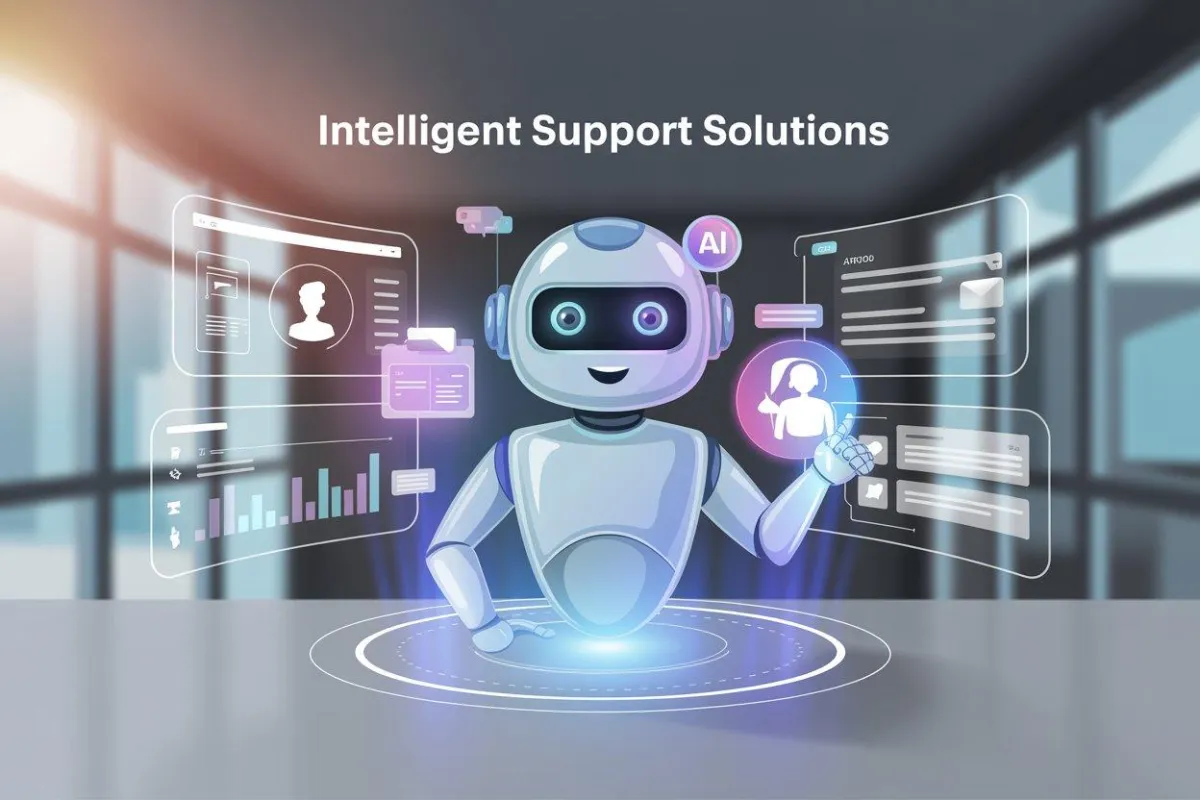
The Ultimate Guide to AI Customer Service: Revolutionizing Support in 2025
What Is AI Customer Service?
AI customer service represents the integration of artificial intelligence technologies into customer support operations to automate, enhance, and optimize the entire customer experience journey. This revolutionary approach combines machine learning, natural language processing, and predictive analytics to create intelligent support systems that understand, respond to, and resolve customer inquiries with human-like precision.
At its core, customer service AI encompasses chatbots, virtual assistants, automated ticketing systems, and intelligent routing mechanisms that work together to create seamless support experiences. These systems learn from every interaction, continuously improving their ability to understand customer intent and deliver accurate solutions.
The technology goes far beyond simple scripted responses. Modern AI and customer service integration involves sophisticated algorithms that can analyze sentiment, predict customer needs, and even proactively reach out to prevent issues before they escalate. This creates a support ecosystem that's both reactive and proactive, addressing current problems while preventing future ones.
Why It Matters in 2025
AI in customer service has become critical because traditional support models simply cannot meet modern expectations. Customers demand instant, accurate, and personalized responses across multiple channels simultaneously. Human agents, no matter how skilled, face limitations in availability, consistency, and processing speed that AI systems effortlessly overcome.
The competitive advantage is undeniable. Companies implementing AI customer support report average cost reductions of 30-40% while simultaneously improving key performance metrics. Response times drop from hours to seconds, customer satisfaction scores increase by an average of 25%, and support teams can focus on complex, high-value interactions instead of repetitive queries.
Economic pressures make this transformation inevitable. With labor costs rising and customer volume increasing, businesses need scalable solutions that maintain quality while controlling expenses. Customer support AI provides exactly this—infinite scalability without proportional cost increases.
Challenges with Traditional Customer Service Systems
Traditional support systems create bottlenecks that frustrate customers and exhaust teams. The most critical issues include inconsistent response times, with some customers waiting minutes while others wait hours for identical problems. This inconsistency damages brand perception and creates negative experiences that spread through social media and reviews.
Human limitations compound these problems. Even exceptional agents experience fatigue, emotional stress, and knowledge gaps that affect performance. Training new staff takes months, turnover rates average 75% annually in customer service roles, and maintaining consistent quality across large teams becomes increasingly difficult as businesses scale.
AI powered customer service addresses these fundamental limitations by providing consistent, accurate responses regardless of volume, time of day, or complexity level. The technology never gets tired, never has bad days, and maintains the same high-quality interaction standards for every customer.
Information silos represent another major challenge. Traditional systems often fragment customer data across multiple platforms, making it impossible for agents to access complete customer histories quickly. This leads to repetitive questions, longer resolution times, and frustrated customers who must explain their problems multiple times.
How AI Customer Service Solves These Issues
AI customer service eliminates response time inconsistencies through intelligent automation that provides instant acknowledgment and immediate resolution for common inquiries. Advanced systems can handle 80% of routine questions without human intervention, freeing agents to focus on complex issues that require emotional intelligence and creative problem-solving.
The technology creates unified customer profiles that consolidate all interaction history, purchase data, and preference information in real-time. When customers contact support, AI systems instantly analyze their complete relationship with your company, enabling personalized responses that demonstrate understanding and care.
Scalability becomes effortless with customer service AI implementation. Whether you receive 100 or 10,000 inquiries daily, AI systems maintain consistent response quality and speed. This eliminates the traditional challenge of staffing for peak periods while avoiding overstaffing during slower times.
Quality control reaches new levels through AI monitoring and analysis. Every interaction generates data that improves future responses, creates training opportunities for human agents, and identifies trends that inform product development and customer success strategies.
Tools That Power AI Customer Service
Leading AI and customer service platforms include Zendesk Answer Bot, which integrates seamlessly with existing support workflows while providing intelligent automation capabilities. This tool analyzes support tickets, suggests responses to agents, and automatically resolves straightforward inquiries using machine learning algorithms trained on your company's knowledge base.
Intercom's Resolution Bot exemplifies next-generation customer support AI by combining natural language processing with predictive analytics. The platform can understand customer intent from the first message, route complex issues to appropriate specialists, and maintain context throughout multi-channel conversations.
Salesforce Einstein Case Classification revolutionizes ticket management by automatically categorizing, prioritizing, and routing support requests based on urgency, customer value, and agent expertise. This ensures high-priority issues receive immediate attention while routine requests flow through automated resolution pathways.
Microsoft Bot Framework provides enterprise-grade development tools for creating custom AI customer support solutions tailored to specific industry requirements. Companies can build sophisticated conversational AI that integrates with existing CRM systems, knowledge bases, and business applications.
Benefits for Businesses & Customers
Businesses implementing AI powered customer service experience immediate operational improvements that compound over time. Cost reduction averages 35% in the first year as automated systems handle routine inquiries that previously required human intervention. This frees up budget for strategic initiatives while maintaining superior service quality.
Customer satisfaction scores typically increase 20-30% within six months of implementation. AI customer service provides consistent, accurate responses that resolve issues faster than traditional methods. Customers appreciate the immediate availability and the system's ability to remember previous interactions and preferences.
Revenue impact becomes significant as improved support experiences drive customer retention and referrals. Studies show that companies with excellent customer service grow revenues 4-8% above their market average. Customer service AI makes excellent service scalable and sustainable.
Employee satisfaction improves dramatically when AI handles repetitive tasks, allowing human agents to focus on meaningful work that requires creativity, empathy, and complex problem-solving skills. This reduces turnover, improves team morale, and creates opportunities for career advancement in strategic customer success roles.
Data insights generated by AI in customer service systems provide valuable intelligence for product development, marketing strategies, and business planning. Every customer interaction creates actionable data that informs decision-making across the entire organization.
Real-World Use Cases
Sephora transformed their customer experience using AI customer service chatbots that provide personalized product recommendations based on customer preferences, purchase history, and current trends. The system handles over 5 million conversations monthly while maintaining a 90% customer satisfaction rate and generating significant incremental revenue through intelligent upselling.
H&M implemented customer support AI that manages returns, exchanges, and size consultations across multiple languages and regions. Their AI system processes 2.3 million inquiries monthly, reducing human agent workload by 70% while improving response times from 24 hours to under 2 minutes.
American Express uses advanced AI and customer service integration to predict and prevent account issues before customers experience problems. Their proactive system identifies unusual spending patterns, potential fraud, and account limitations, automatically resolving issues or alerting customers with personalized solutions.
Spotify's AI-powered support system analyzes user behavior patterns to provide personalized troubleshooting and feature recommendations. The platform resolves 85% of technical issues automatically while creating opportunities for feature discovery and user engagement that drive subscription retention.
How to Implement It in Your Business
Step 1: Assessment and Planning
Begin by analyzing your current support volume, common inquiry types, and existing system capabilities. Identify the 20% of questions that generate 80% of support tickets—these become prime candidates for AI automation. Document your customer journey mapping to understand all touchpoints where AI customer service can add value.
Step 2: Platform Selection and Integration
Choose customer service AI tools that integrate seamlessly with your existing CRM, help desk, and communication platforms. Prioritize solutions that offer robust APIs, comprehensive analytics, and scalable pricing models. Ensure the selected platform supports your industry's specific requirements and compliance needs.
Step 3: Training and Optimization
Feed your knowledge base, FAQ content, and historical support interactions into the AI system for initial training. Create conversation flows that match your brand voice and escalation procedures. Continuously refine the system based on customer feedback and performance metrics to improve accuracy and satisfaction rates.
Key Pitfalls or Considerations
Over-automation represents the most common mistake in AI customer service implementation. While AI excels at handling routine inquiries, complex emotional situations still require human empathy and creativity. Maintain clear escalation paths and ensure customers can easily access human agents when needed.
Data privacy and security require careful attention when implementing AI in customer service systems. Ensure all AI platforms comply with GDPR, CCPA, and industry-specific regulations. Implement robust data encryption, access controls, and audit trails to protect customer information and maintain compliance.
Integration challenges can derail implementations if not properly planned. Legacy systems may require custom development work to connect with modern customer support AI platforms. Budget additional time and resources for technical integration, data migration, and staff training to ensure smooth transitions.
Brand voice consistency becomes critical as AI systems interact directly with customers. Poorly configured systems can deliver responses that feel robotic or misaligned with company culture. Invest time in training AI systems to match your brand personality and communication style.
Future Trends to Watch
Predictive customer service represents the next evolution in AI powered customer service technology. Advanced systems will anticipate customer needs based on usage patterns, behavioral data, and predictive modeling to resolve issues before customers experience problems. This proactive approach will transform support from reactive problem-solving to preventive customer success.
Emotional AI capabilities are rapidly advancing, enabling AI customer service systems to recognize and respond to customer emotions with appropriate empathy and support strategies. These systems will adapt their communication style based on detected frustration, satisfaction, or confusion levels to optimize interaction outcomes.
Multi-modal AI integration will enable customer service AI systems to process voice, text, images, and video simultaneously for comprehensive problem-solving. Customers will be able to show problems through photos or videos while receiving real-time guidance and solutions.
Hyper-personalization through AI will create individually tailored support experiences based on customer preferences, communication styles, and historical interactions. Each customer will receive customized service approaches optimized for their specific needs and preferences.
Final Thoughts
The transformation to AI customer service isn't optional—it's inevitable. Companies that embrace this technology now gain competitive advantages that compound over time, while those that delay risk being left behind by more agile competitors.
The implementation process requires strategic planning, proper tool selection, and ongoing optimization, but the results justify the investment. Reduced costs, improved satisfaction, and scalable growth make customer service AI one of the highest-ROI technology investments available today.
Your customers expect better experiences, your team deserves better tools, and your business needs sustainable growth strategies. AI and customer service integration delivers all three while positioning your company for future success in an increasingly competitive marketplace.

